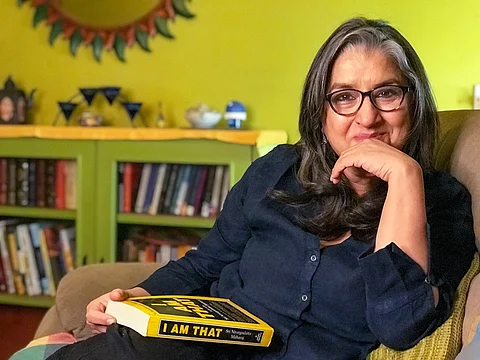

It is frankly disheartening to see the frequency with which cases of sexual abuse and domestic violence come into the light. Thousands of helpless victims are stuck in abusive relationships and oppressive conditions with no means of support or escape. The individual’s sense of identity and spirit is quashed and buried under heaps of trauma inflicted by the abusers. Smita Bharti is an activist, playwright and a poet who walked out of an abusive marriage herself after suffering for 12 long years. She intimately understands the burden of this trauma and therefore uses her experiences to help heal fellow survivors of abuse through the poetic and artistic outlet of theatre.
Smita Bharti was born in Bihai, Chhattisgarh in 1964 and studied at the Auckland School Shimla where she was introduced to theatre at the age of 5. A voracious reader and a loner, books were her comfort and peers throughout her life, teaching her the intricacies of human nature. introduced to the fantastical world of reading at the age of five when she received her first Enid Blyton novel. Her uncle brought home about a 100 books of original three act comedy plays performed at the Gaiety Theatre in Shimla by the Britishers from the early 1900s. She inherited a library of books left behind by six uncles, and as many aunts, which ranged from Hindu Mythology to Cowboy series to Harold Robbins, to Arthur Hailey, not to miss the entire universe of prolific mystery writer Enid Blyton.
She was loner in her formative years. Not because she was aloof, or not approachable, but it was because she was harbouring a huge secret. She was sexually abused at the age of 6. Furthermore, she was married at the young age of 19. Her marriage lasted 12 years during which she gave birth to two children. Stuck in the abusive marriage, she often wondered to herself, “Why is this happening to me?” But her spirit was not subdued. She says her two children and her reams of poetry helped her in keeping her sanity through the 12 years of exile. She left the marriage in 1995 holding the hands of her children, with no plan in mind and into nothingness. No maintenance, alimony, bank account, house or even a CV. She had never worked till then and this weighed heavy on her mind as she walked into nothing with nothing.
This was 26 years ago. After a lifetime of questioning the compulsion that kept her bound to violence for 12 years of her life, she held a pen and started to write a new chapter in her own life. She decided to use her gifts of imagination and writing to help others understand their predicament through the artistic medium of theatre and poetry. She has spent the past 26 years writing plays and poems with the purpose of empowering the victims of abuse, so they can find the courage in themselves to firmly say “this abuse is not my identity, I deserve better”. Her endeavours took her into prisons, colleges, villages, communities, and corporations. She talked to writers, artists, academics, philosophers, students, leaders, judges, prisoners, teachers, professionals, students, wives, mothers and daughters, asking them the same question, "what makes us say yes when we want to say NO?".
Since 2000, Ms. Bharti has engaged people in the art of storytelling and role-playing that allow re-scripting of personal experiences by finding the space and courage to ask the uncomfortable questions, leading to difficult conversations that disrupt the misogynist status quo. She has written several critically acclaimed plays that tackle the sensitive issue of sexual abuse. In 2013, she wrote and directed Jug Jug Jiyo which went on to win the UNFPA Laadli Media Award for Best Play.
Currently Ms. Bharti is the Executive Director of human rights based NGO, Sakshi. She has been with Sakshi for two decades as a theatre practitioner working with women who have survived third-degree domestic violence. For her over 2 decades of efforts, she received the Karmaveer Gold Chakra and Karmaveer Puraskaar for Social Change and Justice in 2016. She is also the programme director of The Rakshin Project, a youth-led movement across 40,000 colleges pan-India to prevent, prohibit and resolve child sexual abuse.
Her desire to help others is limitless. To her, what matters is that every youth, every survivor, who has ever experienced what she has been through, knows what is happening to them, and that they are not to blame and the trauma inflicted upon them is not their fault. That they know what the violation of a personal boundary is, that they know when and how to say no, and most importantly, that their consent is critical at every stage. This is what she lives for and works for. Ceaselessly. Relentlessly.